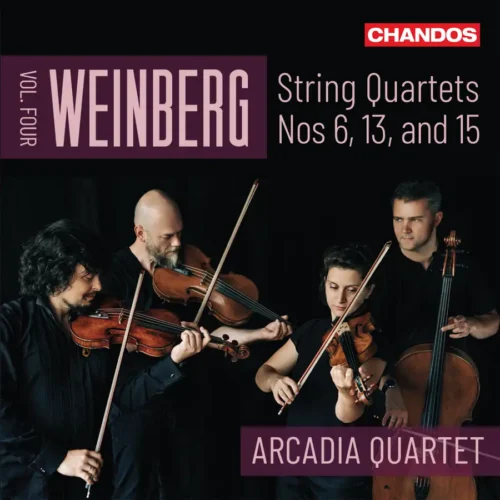The Arcadia Quartet continues its excellent recording of the 17 quartets by Mieczysław Weinberg, a 20th-century composer who is increasingly well known and recognised. A genius of the order of Shostakovich, with whom he shares the same sound universe, without ever appearing inferior to him. On the contrary, it is increasingly accepted that Weinberg may have inspired Shostakovich in the writing of certain works.
Quartet No. 6 Op. 35 was written in 1946. It still bears the scars of the war, the dramatic darkness of which fully colours the score. There was nothing like it in Soviet music at the time, not even Shostakovich. In fact, shortly afterwards, this quartet found itself on the Communists’ list of non-recommendable music. It was never performed during the composer’s lifetime. It is an ample work, with a Beethovenian breath and an instrumental colour that is often bold and piquant. At times gloomily panoramic, at others savagely energetic, it is a tragedy in six acts, some of which, such as the 5th, offer us a veritable lesson in textural and colouristic interplay.
Quartet No. 13 Op. 118 and No. 15 Op. 124 were composed after Shostakovich’s death, and betray Weinberg’s desire to go even further harmonically than his elder. Weinberg openly flirts with atonalism, approaching it to a degree never before achieved by Shostakovich. Despite their elusive nature, both harmonically and thematically, the two opuses remain stimulating because of the narrative force that Weinberg always manages to infuse into them. Demanding and complex, never cold and cerebral.
The Arcadia Quartet continue in the vein of their previous releases, demonstrating an excellent understanding of this music, an irreproachable quality of playing and, above all, an expansive but perfectly focused passion.
At the risk of repeating myself, Weinberg is THE 20th century composer to discover among all those who still remain in the shadow of the great names more frequently played in concert. What an emblematic sound world of the last century, with its creaking, its darkness, but also its light that pierces the dark veil of drama despite everything. Weinberg captures us whole and holds us in his expressive nets. We are glued to the desolate, deceptively placid pictures he draws. And then, all of a sudden, he whips us along at a frantic, manic gallop towards an unsuspected goal, before releasing us, alone and distraught. Cinema couldn’t do better. Weinberg is an absolute must for anyone who loves Shostakovich and wants more.
























